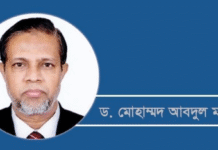FAO representative stresses sustainability of food security
Reaz Ahmad
Bangladesh can deservedly bask in the glory of tripling its rice output in a span of four decades, but its aspiration to become a middle-income country by its 50th birthday remains hard to achieve until nutrition concerns are addressed.
Speaking exclusively to The Daily Star ahead of the World Food Day, Mike Robson, the UN Food and Agriculture Organisation (FAO) representative in Bangladesh, said, “This country [Bangladesh] has demonstrated a good example on how to increase farm productivity.
“But keeping 40 percent of its child population [under-five] stunted, it can’t achieve the goal of becoming a middle-income country by 2021.”
Rice is the predominant staple food in at least 33 developing countries, providing 27 percent of dietary energy supply, whereas people in rural Bangladesh depend on rice for an astoundingly high percentage (71) of dietary energy.
Pointing to this statistics, Robson yesterday said efforts to ensure food security in Bangladesh need to focus on “nutrition-sensible solutions.” A diverse diet containing balanced amounts of fresh fruits and vegetables, cereals, fats and oils, legumes and animal-source foods can provide the full range of nutrients needed for healthy growth, he added.
Globally, the World Food Day will be observed tomorrow with the theme “Sustainable Food Systems for Food Security and Nutrition”. But Bangladesh has decided to observe the day on October 24 since the occasion coincides with Eid-ul-Azha this year.
A total of 842 million people, about one in eight people in the world, are still suffering from chronic hunger, regularly not getting enough food to conduct an active life, according to the State of Food Insecurity (SOFI) report.
The report was published ahead of the Food Day by three Rome-based UN food organisations — FAO, World Food Programme (WFP) and the International Fund for Agricultural Development (IFAD).
Bangladesh will be celebrating the day in a befitting manner this year because it is among the world’s 20 countries that have been recognised by the United Nations for achieving the Millennium Development Goal to halve the incidence of hunger (known as MDG-1) well ahead of target year 2015.
The 2013 SOFI report stated, “Food security in Bangladesh is challenged by a host of factors ranging from the country’s ever-increasing population density, climate change, scarce natural resources (with nearly no agricultural land left untilled), vulnerability to price shocks and persistent poverty.
“In spite of these constraints, Bangladesh has already met the MDG hunger target. This remarkable feat was achieved in the context of rapid economic growth in the 1990s spurred by significant growth in agricultural productivity and driven by a combination of factors including macroeconomic stability, liberalization of input markets and opening up of the economy.”
However, some 25 million people still remain undernourished, said the report.
The FAO representative underlined the need for further efforts to have the people at the bottom of the poverty line graduate to a food-secure level by providing them with nutritious diets.
He stressed a gradual shift towards surface water from groundwater for meeting irrigation requirements, as “winter rice [Boro] is very taxing on the groundwater reserve”.
Robson observed that Bangladesh can do well growing more maize and wheat in the north and thereby further diversify its range of cereal production.
He also cautioned against over-use of chemical fertilisers and pesticides and called upon policy makers to work on alternate livelihoods for the people in the south, whose croplands have been badly affected by saline water.
“Many croplands in the south may become un-farmable in 20 years’ time,” Robson warned, urging the policy makers to focus on the looming crisis.
The FAO is providing 25 million dollars’ worth technical assistance to Bangladesh this year while remaining engaged in some other multi-stakeholders’ programmes in the country, including the areas of climate change resilience and food security and safety.
Source: The Daily Star










